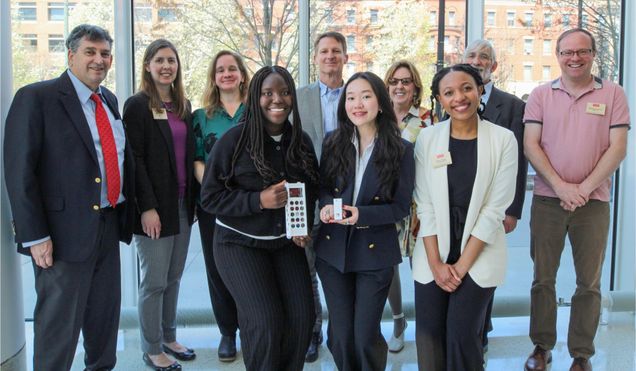Campus Climate Lab award goes to BU College of Engineering students assessing indoor air quality in BU buildings
By Alison Gold
Many students know the feeling of sitting in a classroom that’s either too hot or too cold, too humid or too dry, or just plain stuffy. Poor ventilation can cause high levels of CO2, potentially leading to health consequences. In this environment, it can be challenging for students to learn and perform at their best.
A group of Boston University College of Engineering (ENG) students is working to improve indoor air quality in academic buildings, starting right here at BU. The team won this year’s Anthony Janetos Climate Action Prize for their work pioneering continuous indoor air monitors with the support of Campus Climate Lab (CCL) funding. Using low-cost sensors, their project set out to more quickly and economically identify which BU rooms would benefit from improved heating, cooling, and ventilation systems.
The Janetos Prize is awarded annually at the CCL Symposium, held this year on April 23, to students conducting work with significant potential impact on BU’s Climate Action Plan. The 2025 winners include:
- Celine Chen (Electrical and Computer Engineering)
- Primah Muwanga (Computing and Data Science)
- Ellen Zheng (Electrical and Computer Engineering)
The Climate Action Prize review committee also applauds the leadership of faculty mentor Thomas Little, an ENG professor and associate dean of Educational Initiatives, as well as former students who contributed to the project, Maribel Boujaoude (Electrical and Computer Engineering) and Yangyang Zhang (Electrical and Computer Engineering), who have since graduated.
“The team that developed this project worked on it over several years — initially developing proof of concept, then evolving the design as new, lower-cost wireless air quality sensors became available, and more recently demonstrating the importance of air quality and energy efficiency assessment to make BU’s buildings more sustainable and healthy,” said Michael Gevelber, an ENG research associate professor and Campus Climate Lab director. “This project shows the importance of not only doing research, but also working together with BU facility staff to help ensure a more sustainable campus is achieved. We expect these results will also benefit the broader built environment community.”
“All in all, we created an end-to-end system that’s easily deployable and transferable into any building,” Chen said during the group’s presentation.
The team’s work was inspired by the belief that clean indoor air “should not just be about how much you can afford, or where your classroom is assigned, or your college,” Muwanga said. “It should be something that everybody should be able to have.”
CCL is led by IGS, in collaboration with BU Sustainability and the Office of Research. Since its launch in 2020, CCL has awarded $410,000 to 49 projects involving more than 230 students, faculty, and staff.

BU Sustainability), Rebecca Pearl-Martinez (Executive Director, IGS), Thomas Little (Faculty Mentor, Professor, ECE, SE, Associate Dean of Educational Initiatives), Valerie Gamache (widow of Anthony Janetos), Dennis Carlberg (Chief Sustainability Officer, Boston University), Benjamin Sovacool (Director, IGS). Front row (left to right): Primah Muwanga, Celine Chen, Emery Taylor (Campus Climate Lab Coordinator). Photo Credit: Sarah Cruz.
Real-Time Feedback on Environmental Conditions
The team was awarded CCL funding starting in fall 2023, continuing through this spring. Throughout multiple funding cycles, the project grew from an idea to a proof of concept, to a pilot monitoring single classrooms, to its current state: a robust network gathering actionable data on two buildings.
In 2024, the team developed and deployed eight sensors. In 2025, they deployed 21 more devices in both an aging building and a modern building. In total, they gathered approximately 30 million sensor readings from March to April 2025.
Most recently, the group created a wireless data collection, reporting, and analysis framework. Their findings revealed that air quality was better in the newer building compared to the older building. The team has shared these learnings with BU Operations, with the goal of improving air flow and filtration for healthier buildings.
Because the device is “so small and easily able to deploy into other buildings, we hope to measure the air quality in other buildings to see if there’s anything facilities or operations should really do,” Chen said. “BU is all about learning, collaborating, and researching. And we really hope that everyone’s at their peak brain power in order to actually conduct what they love to do, and learn to the best of their capabilities.”
About Campus Climate Lab
This project received funding through CCL, which offers student-mentor teams the opportunity to share their best ideas for research projects to make BU more sustainable. Campus Climate Lab projects span topics related to improving sustainability for the University’s building, operations, and decarbonization; sustainable curriculum development; climate and health; reducing waste; and advocacy and activism.
At this year’s CCL Symposium, 10 teams presented their research on various topics to enhance campus sustainability and implement BU’s Climate Action Plan. These projects have tackled a wide range of sustainability strategies—including how to eliminate microplastics in BU’s laundry wastewater, improving the University’s urban mulch bed practices to reduce carbon emissions, and the development and testing of algae bioreactors that produce sustainable electricity and absorb CO2, among other projects. Learn more about all the CCL projects.
